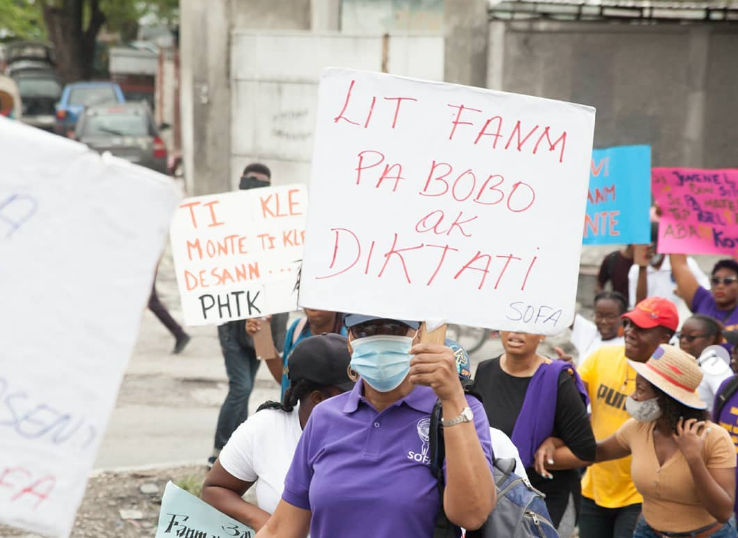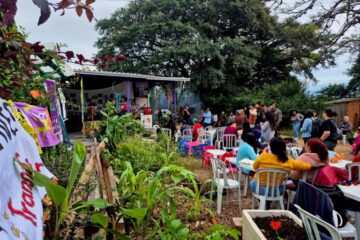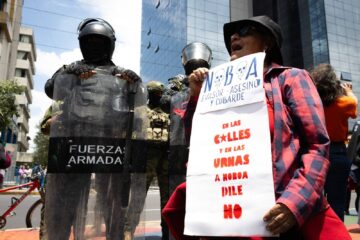Learning about experiences of grassroots feminist reconstruction from different territories allows us to formulate collective starting points and ways to reorganize life in face of extreme climate events. These extreme events are part of the current model of reproduction, production, and consumption under the system of multiple oppressions, and they aggravate the capital-life conflict. Through women’s collective organizing, we establish practices and initiatives that are centered around solidarity to ensure the sustainability of life under harsh conditions. The webinar “Experiences of Feminist Reconstruction After Environment Disasters” featured women from Brazil, Haiti, Cuba, and Turkey sharing experiences of reconstruction. Across these territories, we combine practices of reconstruction and feminist solidarity with a political agenda that tackles the dynamics of capital expansion. This webinar was held on September 29th and was organized by Capire in partnership with Brazilian organizations that are members of the World March of Women, SOF Sempreviva Feminist Organization and CF8 March 8 Feminist Center. Read below the contribution by Sthephanie Simeón of Solidarite Fanm Ayisyèn (SOFA) in Haiti.

I am a member of Solidarite Fanm Ayisyèn (SOFA), which will celebrate 40 years of existence in Haiti in February 2026. SOFA coordinates the World March of Women in Haiti. For SOFA, this is an opportunity to share the experiences of Haitian women with women around the world.
It can be said that Haiti has always lived under the threat of natural disasters, such as earthquakes, hurricanes, or storms. These phenomena not only shape its history but also profoundly influence the country’s social, cultural, and political life. If we trace a timeline of natural disasters in Haiti, we can look back to the 1960s and move forward to 2021–2022: we were struck by several hurricanes, including Tropical Storm Flora in 1963 and Hurricane Georges in 1998. These disasters brought severe human losses and significant damage to the country’s infrastructure.
These events left a deep mark on community memory and gave rise to countless stories of survival. Our grandparents tell us how they lived through these moments, how some people managed to survive, and how they organized around practices of solidarity and resilience.
From the 1990s through the early 2000s, the frequency and intensity of natural disasters in Haiti increased and became more recurrent: we faced torrential rains and floods in 2004, especially during Hurricane Jeanne, Tropical Storm Fay, and Hurricane Gustav in 2008; and we were struck by the major 2010 earthquake, which caused nearly 300,000 deaths, according to official data.
We understand that environmental degradation (especially severe deforestation linked to precarious conditions and systemic vulnerabilities) has contributed to the intensification of natural disasters since the 2000s.
The earthquake of January 12, 2010, was truly devastating and took the lives of three emblematic figures of the Haitian feminist movement: we lost Margalie Massenet, founder of the organization Témoins-Formes (Witnesses and Formation), dedicated to defending women’s rights; we lost Anne-Marie Coriolan, a committed feminist activist who disappeared during the earthquake; and we also lost Myriam Merlet, who played a key role in the recognition of rape as a crime in Haiti.
The earthquake not only took many of our brothers and sisters, but it also profoundly affected the feminist movement with the loss of these three women. For SOFA — and for all feminist organizations — in the aftermath of the earthquake, it was vital to organize a symbolic ceremony to honor these three activists.
Their bodies were never found, but in the days following the disaster, we held a symbolic ceremony to honor their memory and, above all, to affirm the continuation of their struggle for women’s rights despite the tragedy.
On March 8, 2011, feminist organizations affiliated with SOFA marched in memory of the women who died during the earthquake, especially in honor of these three emblematic figures. Thousands of people participated in this march, paying tribute to the victims of the disaster.
When natural disasters strike, it is Haitians themselves who organize to help survivors, creating networks of solidarity and community protection brigades. We can clearly see a particularly strong wave of solidarity among women, who not only support their brothers and sisters but also ensure continuity of care, distribute medicine to the wounded, and accompany survivors.
Since Cyclone Gordon in the 1990s through the most recent disasters, SOFA has developed a multilevel approach that addresses the three key moments that must be faced during natural disasters. This approach includes emergency management. In 2010 and again in 2016, with Hurricane Matthew, SOFA responded quickly and spontaneously to the vital needs of affected populations.
We created an entire network with other women’s organizations to distribute food, collect clothing, redistribute it, and prepare hygiene kits specifically for women. We also shared knowledge with women to help them face challenges. For us, this first phase is crucial, because it ensures immediate life-saving support for vulnerable people, especially women and children, who are often the most impacted. This is the first phase of our daily response to natural disasters, but we also work at the level of recovery: after the emergency, we focus on psychosocial support, addressing violence, and strengthening local capacities, especially among women.
SOFA set up various psychosocial support centers in the South, in Grand’Anse, and in remote regions where the absence of the State is especially evident. We also formed support groups to help survivors — especially women — cope with the trauma and aftermath of natural disasters. This helped restore social cohesion and demonstrated how psychosocial accompaniment strengthens people’s ability to confront the consequences of such crises. SOFA has also contributed to transforming power relations within communities. This phase showed that social intervention is not limited to material assistance, it also involves rebuilding the social and emotional fabric.
We also work at the level of community reconstruction through social and economic support after disasters.
We understand that community recovery can be achieved through economic projects and the strengthening of local resilience.
SOFA has implemented income-generating initiatives and supported women in their projects, especially agricultural and artisanal activities. We also helped some women rebuild their destroyed homes, strengthening their autonomy and their communities, valuing their role in local leadership, and transforming power dynamics.
We played a monitoring role, because not only were women actively engaged in solidarity actions with the Haitian population, but there was also international aid we could not overlook.
After the disasters, women told us they were excluded from humanitarian aid because they were members of SOFA. Some local officials responsible for distributing donations would say: “You are part of a big structure, so you don’t need this help.” Sometimes humanitarian aid was even used as a tool for political influence or clientelism.
As a result, SOFA — and women more broadly — have played a role in observation and oversight, not only to ensure that humanitarian principles are respected but also to defend impartiality and neutrality, and to oppose the concentration of aid that might favor some populations over others.
We can see that these events brought a massive influx of international aid to Haiti, with all the consequences that entails.
If we look at the scandals involving Oxfam or the Clinton Foundation after the January 12, 2010 earthquake, we see that these cases served as a starting point for formalizing and strengthening the humanitarian aid framework in the country.
The Haitian example inspired the adoption of strict policies, such as the zero-tolerance policy and anti-fraud and anti-corruption measures. These reforms aim to genuinely ensure transparency, accountability, and the effective protection of populations.
Natural disasters in Haiti have revealed both the fragility of institutions and the strength of communities — especially the strength of women.
And SOFA demonstrates, time and again, how local action — combining immediate relief, psychosocial support, and economic reconstruction — can transform power relations and strengthen community capacities. As I said in the beginning, I am very happy to share the Haitian experience with you.




